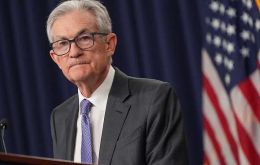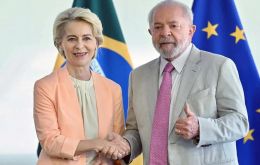MercoPress. South Atlantic News Agency
Economy
-
Friday, January 23rd 2026 - 23:04 UTC
EU and Ecuador wrap up talks on sustainable investment deal, EU’s first SIFA with Latin America

The European Union and Ecuador have concluded negotiations on a Sustainable Investment Facilitation Agreement (SIFA), in what Brussels is portraying as the bloc’s first such deal with a Latin American country, according to an EFE report on Friday.
Add your comment! -
Friday, January 23rd 2026 - 19:19 UTC
EU ‘ready’ to roll out Mercosur deal once South American ratifications start, von der Leyen says

European Commission President Ursula von der Leyen said the European Union is prepared to provisionally implement the EU–Mercosur trade agreement as soon as Mercosur countries begin completing their ratification procedures, seeking to reassure partners after a European Parliament vote injected fresh uncertainty into the bloc’s approval track.
Add your comment! -
Friday, January 23rd 2026 - 18:08 UTC
Argentina’s tax and customs agency complaint targets national football federation over fake invoices

Argentina’s Revenue and Customs Control Agency (ARCA) has filed a fresh complaint against the Argentine Football Association (AFA), alleging undocumented outflows of money and the use of fake invoices, with a preliminary estimated tax damage of more than 375 million pesos (around USD 262,372.01), according to Argentine media reports.
Add your comment! -
Wednesday, January 21st 2026 - 21:26 UTC
European Parliament puts EU-Mercosur trade deal on hold, seeks top court legal opinion

The European Parliament voted on Wednesday to freeze its approval track for the EU-Mercosur trade agreement and request a legal opinion from the Court of Justice of the European Union (CJEU) on whether the deal is compatible with EU treaties. The motion passed by a razor-thin margin —334 in favour, 324 against, with 11 abstentions— injecting new uncertainty into a pact that the two blocs had only just signed in Asunción after a quarter-century of negotiations.
-
Tuesday, January 20th 2026 - 15:29 UTC
Delcy Rodríguez vows 30% increase in gold output to boost hard-currency inflows

Venezuela’s interim president Delcy Rodríguez said her administration aims to raise gold production by 30% in 2026 to generate additional foreign-currency revenues, as the government seeks to shore up public finances and draw fresh investment into the mining sector, according to reports attributed to EFE.
-
Monday, January 19th 2026 - 18:45 UTC
Trump’s obsession: why central bankers came out in support of Fed’s chair Powell

By John Hawkins (*) - Central bankers from around the world have issued a joint statement of support for US Federal Reserve Chair Jerome Powell, as he faces a criminal probe on top of mounting pressure from US President Donald Trump to resign early.
-
Monday, January 19th 2026 - 10:36 UTC
IMF keeps Argentina’s growth outlook at 4% for 2026 and 2027 amid fragile global balance

The International Monetary Fund (IMF) has reaffirmed its projections for Argentina’s economy, forecasting growth of 4% in both 2026 and 2027, unchanged from its previous estimates published in October. The figures appear in the latest update of the World Economic Outlook (WEO), presented on Monday in Brussels.
-
Sunday, January 18th 2026 - 23:20 UTC
With Milei present and Lula absent, Mercosur and EU sign landmark deal in Asunción

The European Union and South America’s Mercosur bloc signed their long-negotiated association and free trade agreement on Saturday in Paraguay, with Argentina’s President Javier Milei attending the ceremony and Brazil’s Luiz Inácio Lula da Silva absent, represented instead by his foreign minister.
-
Saturday, January 17th 2026 - 10:55 UTC
Mercosur and EU sign historic trade agreement in Asunción after 26 years of negotiations

On January 17, 2026, the Mercosur bloc and the European Union (EU) will formalize a comprehensive association and free trade agreement in Asunción, Paraguay, marking the culmination of nearly 26 years of negotiations, according to international and regional news outlets.
-
Friday, January 16th 2026 - 19:07 UTC
Lula and von der Leyen say Mercosur-EU deal advances multilateralism

Brazilian President Luiz Inácio Lula da Silva and European Commission President Ursula von der Leyen agreed on Friday that the free trade agreement between Mercosur and the European Union (EU), due to be signed Saturday in Asunción, will benefit global trade, democracy and multilateralism, EFE reported.
